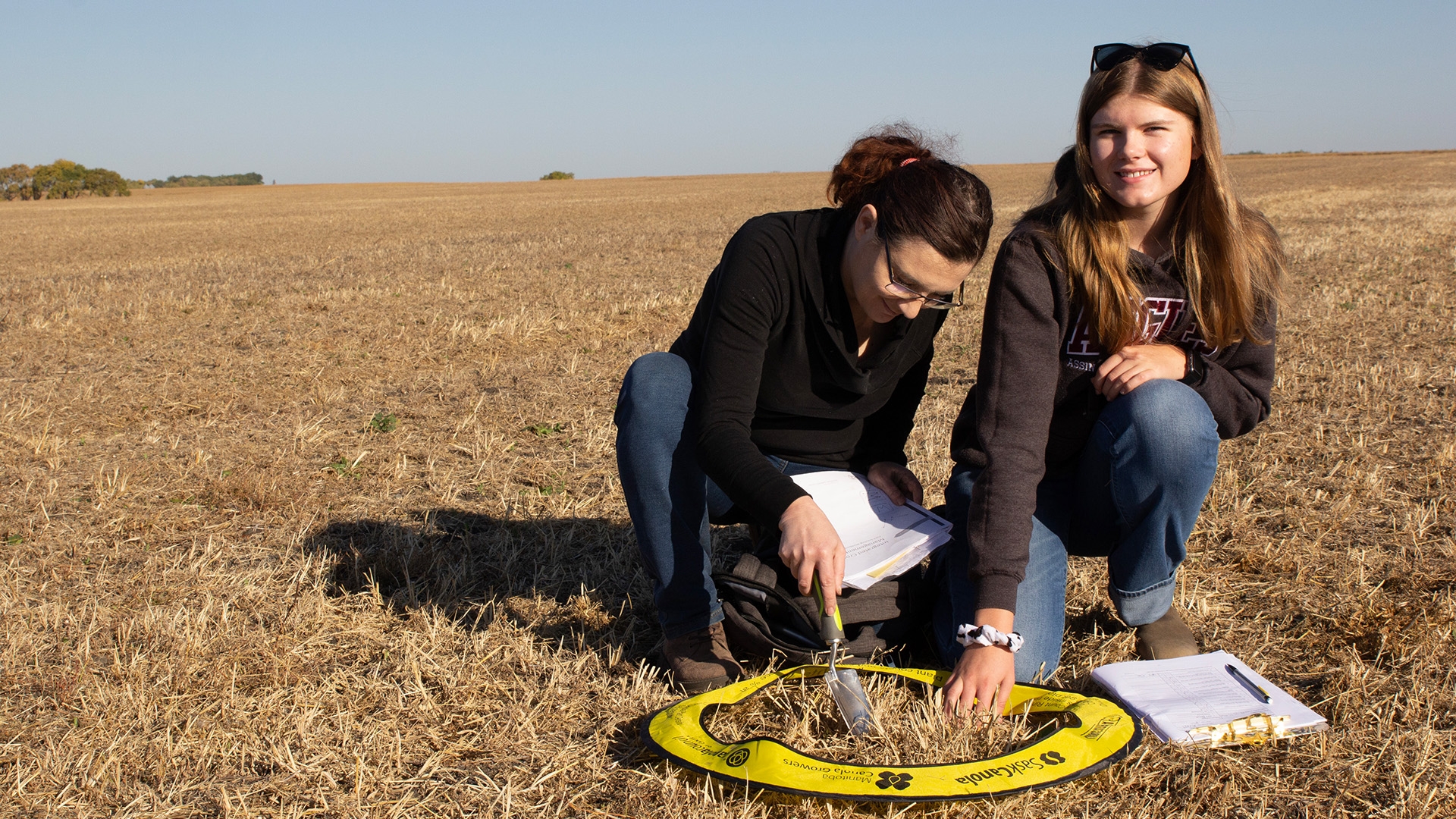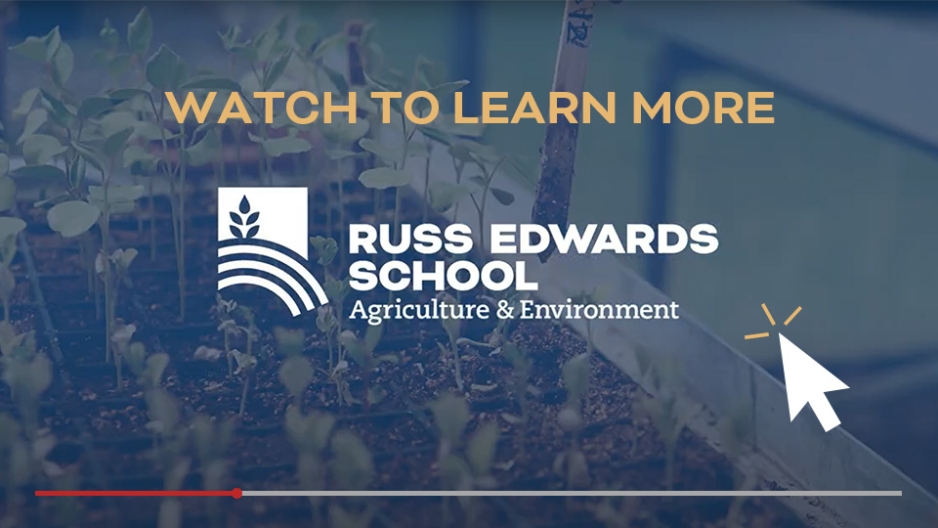Overview
Assiniboine’s two-year Agribusiness diploma enables students to succeed in one of Manitoba’s largest industries with an in-depth education focusing on the science, business and technology aspects of agriculture. The program supports the current and growing labour gap in the agriculture and agri-food sector in Manitoba and Western Canada.
Potential employers include grain sourcing companies, seed and crop inputs suppliers, banks and credit unions, livestock supply outlets, agricultural equipment dealers, government agencies, agronomists/consultants, researchers and insurance companies.
Graduates have the option to seek membership in Manitoba Institute of Agrologists Manitoba as Technical Agrologists, to elect to complete certifications required for Pesticide Applicators/ Dispenser licensing in Manitoba, and to challenge the Prairie Provinces’ Certified Crop Advisor exam.
Program Learning Outcomes
- Integrate and apply various agricultural business skills to industry expectations.
- Integrate and apply various field technical skills to industry standards.
- Develop specialized plans for the agribusiness sector, including commodity marketing plans, marketing and sales strategies, crop and livestock production plans, farm safety and environmental farm plans, agribusiness plans, soil management and soil fertility management plans, and succession/estate management plan.
- Apply agro-ecology and precision agriculture technology knowledge to make appropriate management decisions.
- Apply environmental land management practices to agricultural land use and landscapes.
- Employ precision agriculture skills and other technologies to solve problems in industry applications.
- Apply principles of macro and microeconomics, financial accounting, and math in the context of agricultural business practices.
- Analyze and evaluate financial statements, budgets, and investment decisions relevant to the agribusiness sector.
- Apply business principles and management techniques to agricultural operations and practices.
- Evaluate and implement risk management strategies for agricultural operations.
- Evaluate and apply supply chain management principles in the agribusiness sector.
- Design cropping systems and apply effective practices in crop production systems in Western Canada including integrated approaches.
- Develop Integrated Pest Management systems including assessment techniques, field scouting procedures, and appropriate record keeping.
- Apply occupational health and safety measures, demonstrate mental health awareness in agriculture, and use safe equipment operation and maintenance procedures for equipment used in agribusiness.
- Apply on-farm production knowledge including codes of practice; nutrition, feed and forage; safety protocols and biosecurity in various areas of Canadian livestock production.
- Apply knowledge of agriculture field equipment and their suitability to farm operations based on evaluation of key considerations including utilization, cost and return on investment.
- Demonstrate professionalism, ethical behaviour, critical thinking, creativity, effective communication, and conflict management strategies in the workplace.
- Demonstrate proficiency in computer applications and software relevant to the agribusiness sector.
Examples of what jobs graduates from this program can do:
- Career opportunities include entry-level positions in agriculture, agronomy, sales and service, finance, livestock, marketing, management, research, administration and precision agriculture.
Success Factors
You might be a good fit for this program if you would enjoy any of the following:
- A career in or supporting the agricultural and food production industry
- A business-focused program, including sales, budgets, operations, and planning
- Collecting, organizing, and analyzing data to solve problems
- Interpreting and applying various acts, regulations, policies, and procedures
- Learning new technologies and software applications
- Potential to work in a variety of urban and rural communities in both indoor and outdoor settings
A valid driver’s license and access to a vehicle is strongly recommended given the potential need to travel for co-op placement.
The industry and program environment often requires individuals to:
- Be able and willing to travel.
- Possess a valid driver’s license, and access to a vehicle.
- Ability to quickly problem solve and deal with customer conflicts and complaints in a professional manner.
- Form and maintain strong customer and client relationships with diverse stakeholders including producers.
- Apply business practices to crop, livestock and or mixed farm operations.
- Manage product, price, placement and promotion to sell to and meet customer needs.
- Work in outdoor settings in varied terrain such as a greenhouse, field or pasture; maneuver around equipment, crops, and animals in all kinds of weather.
- Operate equipment as required.
- Be self-motivated and results-oriented with the ability to deliver strong results in an often-unsupervised environment.
Interested in exploring similar program options?
We've got you covered! Here are some other great program options to consider.
Admissions
Admission Requirements
- A complete Manitoba Grade 12 or equivalent
- English 40G/40S or equivalent
- Consumer/Essential Mathematics 40S or equivalent
If you received your education outside of Manitoba, please review the equivalent admission requirements: Interprovincial or International.
English is the language of instruction at Assiniboine. All applicants educated outside of Canada or in a country not on the test exempt list are expected to meet the English language proficiency requirements.
READY TO TAKE THE NEXT STEP IN YOUR EDUCATION JOURNEY?
Start your online application today and join Assiniboine College!
DON'T MEET ADMISSION REQUIREMENTS?
If you don’t meet admission requirements, visit our Centre for Adult Learning to upgrade courses.
ALREADY HAVE A DEGREE OR DIPLOMA? GO A STEP FURTHER.
Fast-track your education journey and take advantage of one of our Advanced Diploma programs.
Careers & Connections
Career Opportunities
- Grain companies
- Seed and fertilizers providers
- Banks and credit unions
- Livestock supply outlets
- Agricultural equipment dealers
- Government agencies
- Agronomy
- Cooperatives
Connections
Agreements exist with the University of Minnesota Crookston for recognition of training received in this program.
Graduates are also eligible:
- For membership in Manitoba Institute of Agrologists as technical agrologists
- To elect to complete certifications required for Pesticide Applicators/Dispenser licensing in Manitoba
- To challenge the Prairie Provinces’ Certified Crop Advisor exam
Assiniboine has a number of agreements with other colleges, universities and professional organizations, making it possible to apply credit taken at Assiniboine to programs at other institutions. For information on agreements, see Articulation Agreements.
Upon completion of this program, graduates will have the following certifications:
- First Aid
- Workplace Hazardous Materials Information System (WHMIS)
Tools & Supplies
We take our program outdoors for field labs, we also have a soils lab and a plant lab equipped with microscopes and growth chambers on campus, as well as a new sustainable greenhouse located at the North Hill Campus. We go on related industry tours and many guest speakers present throughout the year.
Our classrooms, labs and shops are equipped with the necessary equipment that you need to make the most of your experience. However, there are some tools and supplies that you will need to purchase for personal use to help you with your studies. Much of what you purchase you’ll be able to use after you graduate and begin your career. Tool and supply lists are available from the school office 30 days prior to the start date of the program.
Program Checklists, Textbooks, and Supplies
Program Checklists:
Textbooks:
Supplies:
ASSINIBOINE BOOKSTORE
Textbooks, supplies and uniforms may be purchased at the Assiniboine Bookstore at the Victoria Avenue East Campus. Booklists are available from your school office 30 days prior to the start date of your program.
Technology Requirements
Students in this program are required to bring their own laptop and smartphone for use on-campus. The laptop and smartphone must meet the technical needs outlined by the program. MAC computing devices are not compatible with program software. See Technology Requirements for detailed information.
Courses & Costs
Costs
Estimated Program Costs (Domestic students)
| Year 1 | Year 2 | |
|---|---|---|
| Credits | 63.0 | 60.0 |
| Tuition | $4,090 | $3,660 |
| Course Fees | $1,470 | $1,280 |
| Students' Association fees (including Health Premium) | $635 | $615 |
| Estimated textbooks, tools, and supplies | $910 | $300 |
All fees are estimated and subject to change without notice.
Estimated Program Costs (International students)
| Year 1 | Year 2 | |
|---|---|---|
| Credits | 63.0 | 60.0 |
| Tuition | $17,140 | $16,080 |
| Course Fees | $1,470 | $1,280 |
| Students' Association fees (including Health Premium) | $635 | $615 |
| Required Health Insurance | $825 | $825 |
| Estimated textbooks, tools, and supplies | $910 | $300 |
All fees are estimated and are subject to change without notice. All international students must purchase health insurance. The college adds this fee to your student account and then sends your name and fee to the insurance provider on your behalf.
For more information, visit the Fees and Charges page.
Courses
To graduate with an Agribusiness diploma, students must successfully complete 123 academic credits. The minimum passing grade for each course is indicated on the course outline.
Year 1 Courses
| Title | Credits/CEUs | Elective | Distance | PLAR |
|---|---|---|---|---|
1st Aid - Emergency (HLTH-0030)Basic First Aid and CPR techniques taught in an interactive environment for individuals and employees who want an overview of First Aid and CPR in the workplace or home. The course covers skills needed to recognize, prevent and respond to cardiovascular emergencies for adults, CPR and other topics such as choking, airway and breathing emergencies, and prevention of disease transmission. This course meets the minimum regulations for Workplace Health and Safety for Basic First Aid. Participants who meet the required standard receive a nationally recognized certification that is valid for three years. |
0 credit(s) | No | No | No |
Agribusiness Math (MATH-0106)In this course, students learn to apply mathematical concepts to agricultural, financial and business applications in agribusiness management. More than a math refresher, this course prepares students for performing calculations in subsequent courses, their professional career and personal life. These skills form the foundation to make reliable and profitable decisions essential to the success of agribusinesses through the implementation of new and emerging technologies. |
6 credit(s) | No | No | No |
Agro-Ecology Field Laboratory (AGRC-0162)This course introduces students to key features, challenges and sustainable management of the prairie agro-ecological landscape systems. Based on various field and laboratory exercises and guided site tours, this course provides hands-on training to students by introducing them to various agricultural and environmental sites discussing origin, development and classification of soils, water resources, wetlands and river dynamics, crop agronomy and weeds identification, wild-life habitat, forestry and shelterbelts, the Dominion Land Survey (DLS), mapping and Global Positioning System (GPS), agricultural equipment and livestock production. |
6 credit(s) | No | No | No |
Co-op Work Placement - AGRB (COOP-0034)Prerequisites: PEDV-0313 Professional Development, AGRC-0295 Crop Pest Management, AGRC-0290 Soil & Soil Fertility, HLTH-0277 Occupational Health & Safety, AGRC-0219 Crop Production Systems, plus cumulative weighted grade point average (CWGPA) of 2.0 or greater. |
3 credit(s) | No | No | No |
College Foundations (PEDV-0356)This course improves students' ability to navigate the college experience and environment, including student's rights, roles, and responsibilities. In this course, students reflect on their skills, attitudes, and expectations and develop learning strategies to help them to become successful, resilient, and self-directed learners. The course covers topics such as success in online learning, time management strategies, learning strategies, assessment taking strategies, academic integrity, information and digital literacy, and wellness, among others. It integrates elements of student orientation. |
0 credit(s) | No | No | No |
Communications and Technology (COMP-0571)This course will help students communicate better in the work world. Using technology as a communication tool, students will learn to write, present, organize and interpret data, and interact with the online world. |
6 credit(s) | No | No | No |
Crop Pest Management (AGRC-0295)Corequisite: AGRC-0162 Agro-Ecology Field Laboratory |
6 credit(s) | No | No | No |
Crop Production Systems (AGRC-0219)Prerequisite: AGRC-0278 Food Production Methods |
6 credit(s) | No | No | No |
Financial Accounting 1 (ACCT-0058)Prerequisite: MATH-0106 Agribusiness Math |
6 credit(s) | No | No | No |
Occupational Health & Safety (HLTH-0277)Students learn the importance of having a safety first attitude and the responsibilities of owners, supervisors and employees in applying safe work skills. From primary production to agri-retail service and input supply, businesses require detailed safety systems and programs to manage and control hazards. As agribusinesses grow larger and become specialized with larger equipment, the need for customized components within a safety system increases. Training on Workplace Hazardous Materials Information System (WHMIS 2015), updated with the Globally Harmonized System of Classification, Transportation of Dangerous Goods (TDG), for safe shipping, transporting, receiving and handling of crop protection products and Anhydrous Ammonia is also provided. Safety requirements for businesses covered provincially (Workplace Safety and Health Act-W210) and federally (The Canada Labour Code) is discussed. Gain hands-on experience implementing a safety and health system for an employer in a group project and host a safety workshop showcasing their applied safety training. |
6 credit(s) | No | No | No |
Pesticides in Agriculture (PEST-0103)Prerequisite: MATH-0106 Agribusiness Math |
6 credit(s) | No | No | No |
Professional Development (PEDV-0313)This course prepares students to perform at a high level as stakeholders in the agriculture and environmental industries. Topics include preparing for and understanding the workplace, striving for performance, interacting efficiently, and sharing the organizational vision. |
6 credit(s) | No | No | No |
Soil & Soil Fertility (AGRC-0290)Prerequisites: MATH-0106 Agribusiness Math, AGRC-0162 Agro-Ecology Field Laboratory |
6 credit(s) | No | No | No |
Year 2 Courses
| Title | Credits/CEUs | Elective | Distance | PLAR |
|---|---|---|---|---|
Agribusiness Management (BUSN-0164)Prerequisites: MATH-0106 Agribusiness Math; ACCT-0003 Financial Accounting 1; COMP-0571 Communications and Technology |
6 credit(s) | No | No | No |
Agribusiness Marketing (MKTG-0064)This course provides students with an understanding of marketing in the agriculture industry, with an emphasis placed on agribusiness promotions. Topics include marketing values decisions, understanding consumers' value needs, and value proposition. Students will select an agriculture product or service and create a territory marketing plan throughout the semester. |
6 credit(s) | No | No | No |
Agribusiness Plan (BUSN-0161)Prerequisites: BUSN-0164 Agribusiness Management and MKTG-0064 Agribusiness Marketing |
6 credit(s) | No | No | No |
Agricultural Equipment (AGRC-0296)In this course, students learn about the operation, management and economics of equipment used in agricultural production systems of Western Canada. Students learn about specific requirements and types of equipment for cereal and forage production. Students are exposed to industry through visits, expert talks and equipment walk arounds at various dealerships and manufacturing facilities in the area. Students also learn about Workplace Safety and Health Act (WSH) and Regulations and Safe Operating Procedures (SOPs) related to tractors operation, seeding, spraying, harvesting, forage and hay management equipment. Students also learn about equipment selection and preparation of machinery cost evaluation report for a specific agricultural enterprise. |
6 credit(s) | No | No | No |
Commodity Marketing (MKTG-0063)Students learn the factors that make for profitable commodity marketing in Canada. From classifications, grades, end uses, production, export, consumption, macroeconomics and currency rates, students will gain a better understanding to follow fundamental factors influencing price. Students identify significant grade determinants and practice grain grading techniques while gaining an understanding of supply chain management. Students also learn price risk management strategies to preserve profit margin and increase net returns. A variety of marketing tools such as delivery contracts, hedges and options are examined. Technical analysis, along with basis tracking and assessment skills, are provided to enable the producer to select and time effective market entry and exit. Students gain hands-on experience using a marketing information service platform. |
6 credit(s) | No | No | No |
Customer Relations (BUSN-0163)Prerequisites: PEDV-0313 Professional Development, COMP-0571 Communications and Technology |
6 credit(s) | No | No | No |
Environmental Land Management (ENVR-0038)Prerequisites: AGRC-0290 Soil & Soil Fertility |
6 credit(s) | No | No | No |
Integrated Crop Management (AGRC-0293)Prerequisites: PEST-0103 Pesticides in Agriculture, AGRC-0295 Crop Pest Management, AGRC-0219 Crop Production Systems, AGRC-0290 Soil & Soil Fertility |
6 credit(s) | No | No | No |
Livestock Production (AGRC-0294)Corequisite: ENVR-0038 Environmental Land Management |
6 credit(s) | No | No | No |
Pesticides in Agriculture (PEST-0103)Prerequisite: MATH-0106 Agribusiness Math |
6 credit(s) | No | No | No |
Precision Agriculture (COMP-0570)Corequisite: AGRC-0293 Integrated Crop Management |
6 credit(s) | No | No | No |





